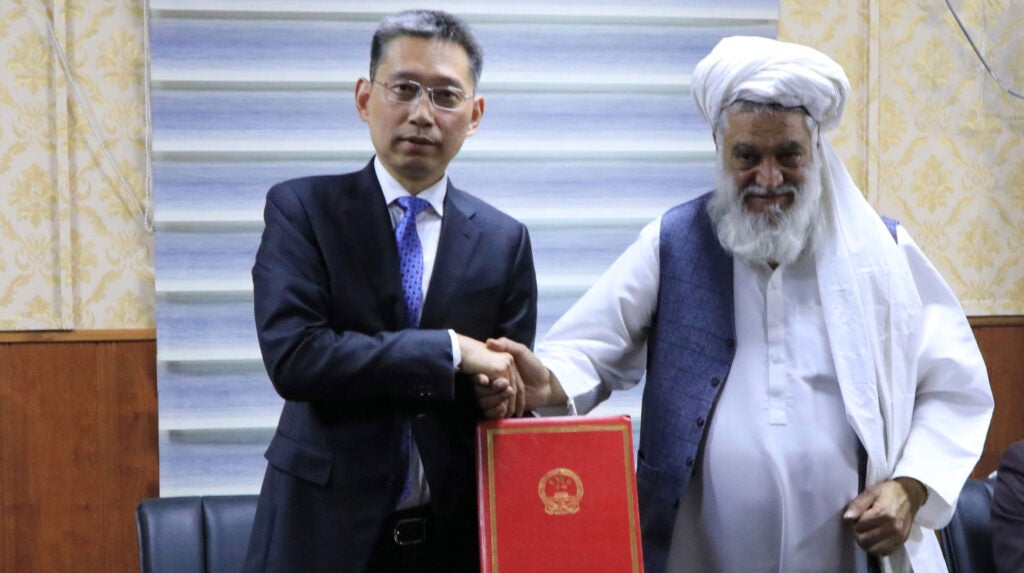One of President Joe Biden’s many foreign policy failures is once again rearing its ugly head.
After two years that have included the Russian invasion of Ukraine and now the war between Hamas and Israel, the botched withdrawal from Afghanistan and subsequent takeover by the Taliban has largely faded from the limelight.
Shockingly, immediately following the fall of Kabul, from August 2021 to September 2022, the U.S. sent more than $1.1 billion in humanitarian assistance to Taliban-ruled Afghanistan via the State Department and the U.S. Agency for International Development.
The Taliban is repaying this generosity by now aligning itself with American’s greatest strategic competitor, China.
China was one of the first countries to grant the Taliban de facto recognition as the successor government to the American-backed Islamic Republic of Afghanistan that fell in 2021, and in September, China became the first country to appoint an ambassador since the takeover.
In October, the Taliban began proceedings to strengthen that relationship by requesting to participate in the China-Pakistan Economic Corridor and the Belt and Road Initiative.
The Belt and Road Initiative is China’s global infrastructure development project, which many analysts think is intended to reorient trade away from the West and toward China. In exchange for natural resources, China builds a “new Silk Road” through these countries, providing roads, power plants, internet service, and other infrastructure.
The China-Pakistan Economic Corridor is the flagship operation of the Belt and Road Initiative, and has spent roughly $62 billion since 2015 to improve Pakistan’s transportation networks and energy projects, including a superhighway meant to link the port of Gwadar with China and bypass the Indian Ocean for China’s energy needs.
Afghanistan’s vast lithium deposits will become available for development by the Chinese, which will only exacerbate the chokehold China has on critical minerals necessary for the functioning of the Biden administration’s various “green energy” projects.
A standard electric vehicle’s 1,000-pound battery includes 25 pounds of lithium, for example, and China possesses or processes 60% of the planet’s lithium. Chinese mining companies are investing heavily in Afghanistan (including in the Mes Aynak copper mine) and the Taliban’s acting minister for commerce and industry recently traveled to Beijing to continue discussions.
Belt and Road Initiative programs allow China to exert its influence around the world, both economically and militarily. Chinese companies are all tied to the government in Beijing by the very nature of the Chinese economic and political system, and Beijing leverages its economic clout for political and military purposes.
If China builds a port, for example, its warships get preferential treatment and it begins to leverage its investment to influence the voting patterns of the host nation at the United Nations.
China has built a permanent naval base in Djibouti, and U.S. defense officials have raised concerns that the Chinese are also looking to establish a base on the Atlantic in Equatorial Guinea.
Chinese investors and construction companies go first, and Chinese diplomats and soldiers follow.
And now Chinese investors are moving into the country the United States just spent 20 years occupying, a country we spent more than $2 trillion trying to build up from 2001 to 2021. Even worse, 13 American service members were killed by a suicide bomber (who had been released from prison by the Taliban) at the Abbey Gate outside Kabul’s Hamid Karzai International Airport as the withdrawal was unfolding, and thousands of American service members died in Afghanistan at the hands of the Taliban over the 20 years following 9/11.
And yet, for over a year after the Taliban’s victory, the Biden administration sent $1 billion in aid to Afghanistan.
The pattern doesn’t stop there, sadly. The Taliban has been selling the weapons left behind in Afghanistan to buyers abroad, and some have already turned up in Gaza.
The Biden administration’s new supplemental budget request comes in at a whopping $106 billion, and includes $9 billion in humanitarian aid that includes aid to Gaza, a polity currently governed by Hamas. Concerns have been raised that the money being sent to Gaza could be appropriated by Hamas.
The U.S. governments sends too much money abroad as it is, and the very least it can do is not send money to governments that hate us.
Have an opinion about this article? To sound off, please email letters@DailySignal.com and we’ll consider publishing your edited remarks in our regular “We Hear You” feature. Remember to include the URL or headline of the article plus your name and town and/or state.
